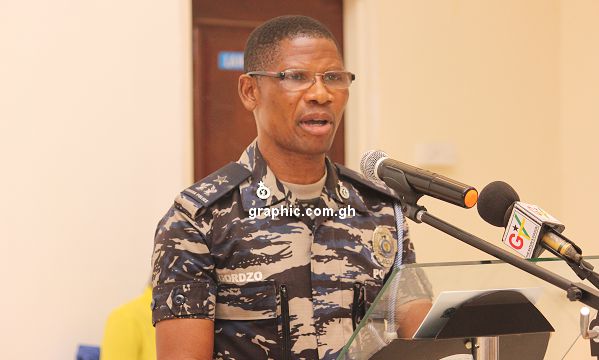
Political vigilantism...Police can’t act, laws on appointments need reforms — ACP Dr Agordzor
The Ghana Police Service and the other security agencies cannot be professional in their efforts to root out the menace of political vigilantism unless the laws that govern the appointment of their leaders and their operations are reformed.
He was speaking at a symposium organised by the Institute for Democratic Governance (IDEG) in Accra last Wednesday, October 31,
Dr Agordzor said vigilante groups operated confidently because they were backed by political parties, adding; “If care is not taken, we will have
“If you thought that vigilante activities constitute a problem now, then wait until it truly explodes. I call it Ghana’s unexploded political ordinance,” he said.
Independent body
Dr Adordzor argued that so long as such provisions remained unchanged to allow for an independent body to select, for instance, the Inspector General of Police (IGP) and give him or her a specific tenure of office, the call on the police to arrest members of vigilante groups who engaged in acts of violence would be unsuccessful due to political interference in their operations.
According to him, politicians and influence peddlers often called to intervene for the release of suspects connected to them.
“I get worried when I hear people lambast the police for failing to arrest these persons. The police have every power to clamp down on them, but how do you expect us to act when our hands are tied under the very laws that govern our operations?,” Dr Agordzor asked, and called for immediate reforms of the Constitution.
“In Ghana, the IGP is appointed by the President and therefore becomes a party member, hence his loyalty is divided and cannot be trusted because he is clearly monitored by the President to work to his advantage”, Dr Agordzor said.
He said the constitutional amendment should only empower the Minister of the Interior to give
He called for a constitutional amendment to enable the IGP to have a fixed term of office; for the Police Service to have an independent Commission to replace the current Police Council; and for the grounds upon which the IGP can be removed to be spelt out so that his or her removal from office would not be based on the whims and caprices of the appointing authority.
Police Council
He also expressed worry over the composition of the Police Council, which he said was chaired by the Vice-President, with its members, including the Attorney General and the Minister of the Interior, being members of the political party in government.
He said such provisions were to blame for the mistrust of the Police Service by some opposition parties, thereby giving them grounds to establish internal security systems that turned up as vigilante groups.
“I recommend that the Police Council be replaced with the Police Commission, with the IGP as its chairman,” Dr Adordzor stated.
Prosecution
Touching on other issues that undermined the efforts of the police to fight the canker, Dr Adordzor indicated that the inability of the police to prosecute persons who were charged with electoral offences, as required by law, encouraged some members of vigilante groups to perpetrate such practices.
“The police must be given the power to prosecute people for electoral
Tackle root causes
For his part, a research fellow at the Kofi Annan International Peacekeeping Training Centre (KAIPTC), Dr Festus K. Aubyn, called on the authorities to focus on tackling the root causes of the formation of the groups, as that was key to fighting the menace.
The root causes, he said, included growing levels of unemployment and poverty, among other socio-economic challenges that had bedevilled the country.
Vigilantism in Ghana
Ghana’s political space has, in recent times, seen an influx of politically motivated vigilante groups.
The formation of these groups has been characterised by pockets of violence in their activities.
A year ago, Delta Force, a vigilante group, stormed a Circuit Court in Kumasi and forcibly freed 13 of their members who were facing charges for causing mayhem at the Ashanti Regional Coordinating Council.
Recently, in Kumasi, some persons believed to be members of the Delta Force attacked the Minister of Monitoring and Evaluation, Dr Anthony Akoto Osei, for reportedly failing to deliver on his promise to give them jobs.
